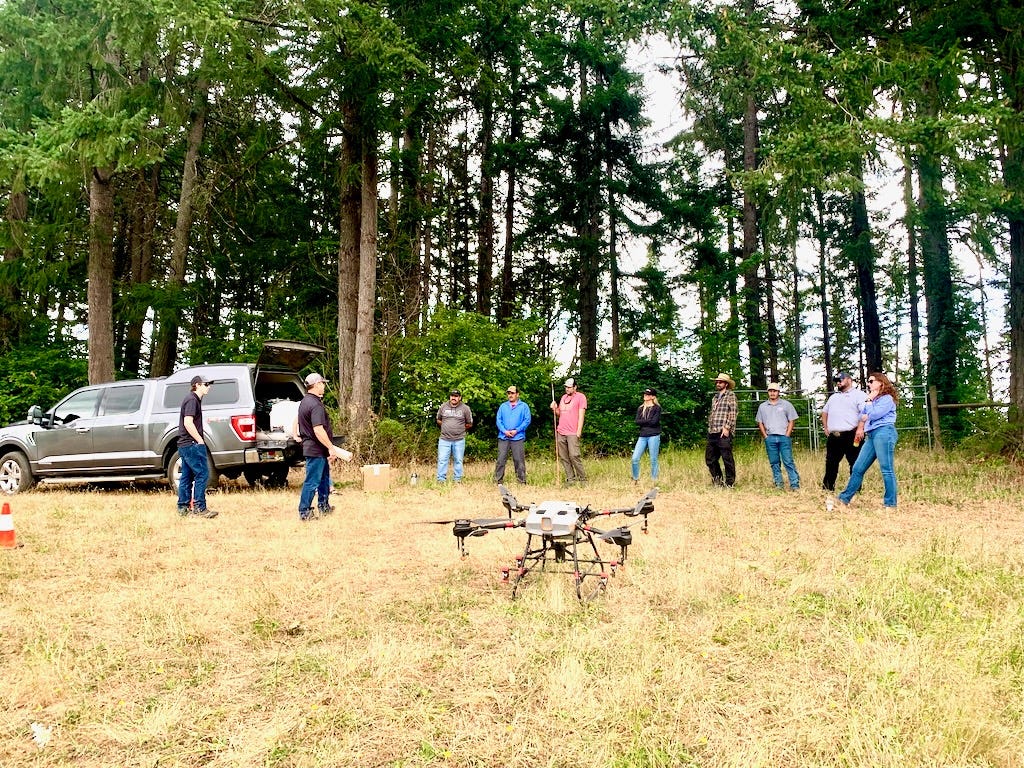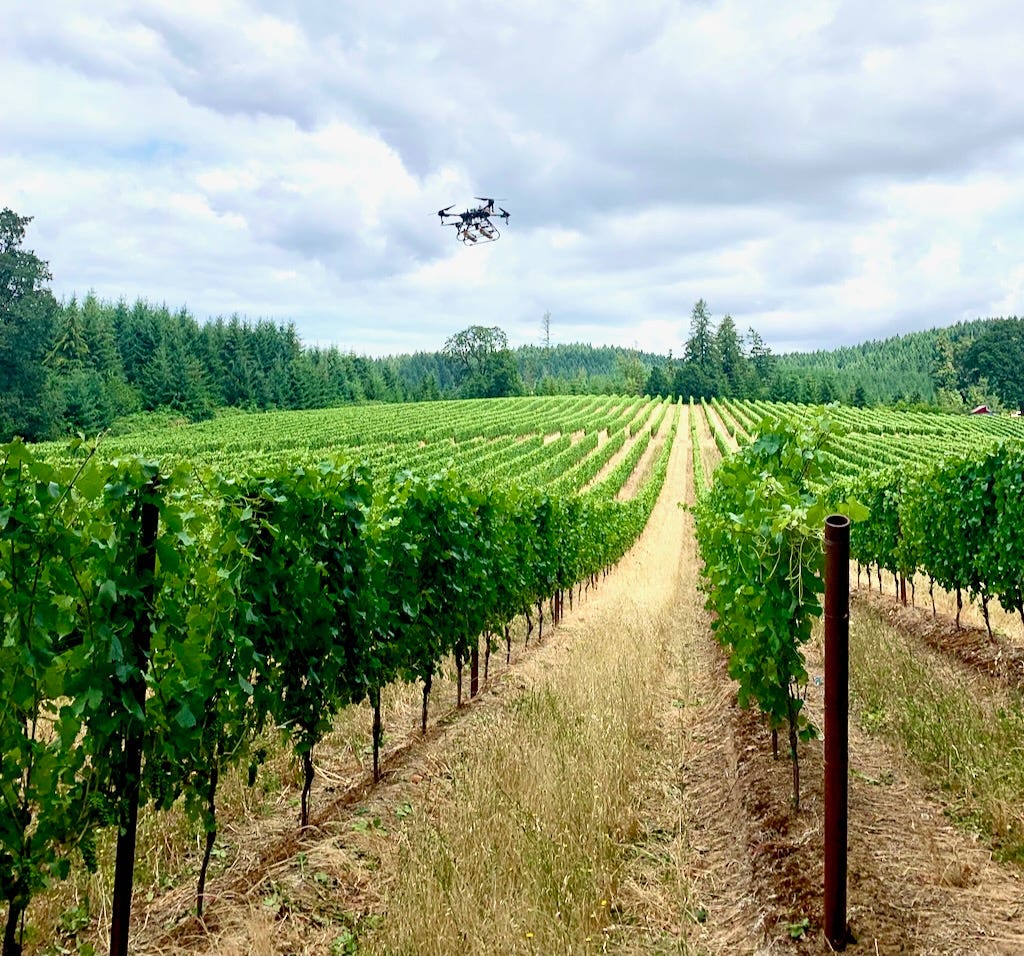The Anti-Mite Launcher
Fighting Mite with Mite
The bears, cougars and deer who visit Kristof Farms are awe-inspiring, and we’ve shared their images in past newsletters. But it’s the microscopic animals that sometimes do more damage to plants like our grape vines and cider apple trees.
A question any farmer (or gardener) has to wrestle with is how much to rely on chemicals. There’s nothing inherently wrong with chemicals – we breathe O2, water our lawns with H2O and season our food with NaCl – but on our farm we do try very hard not to use toxic chemicals that can damage the environment. Instead we try to use natural biological controls on pests, including an experimental effort just a few days ago to control certain kinds of tiny mites in our vineyard.
Those mites are tiny eight-legged creatures less than one millimeter in length, yet they damage leaves and interrupt photosynthesis. If you have a vegetable garden, they may bother your plants as well. They can be controlled with toxic chemicals, but through the company that manages our vineyard, Results Partners in McMinnville, we’re experimenting with a new kind of biological control: It’s time to fight might with might, or rather, mite with mite.
Introducing: The Anti-Mite Launcher…
Here's what we did: A drone released another kind of mite, Neoseiulus californicus, in the vineyard, and this kind is a predatory mite that eats spider mites and rust mites.
Preparations for launching the Anti-Mite Fighter get underway
The Anti Mite Fighter in flight
It’s too early to know if the Neoseiulus californicu are dining on the spider mites and rust mites, but we hope so. And this was an experiment in the area — the first release of this predatory mite – so if it’s successful then we’re guessing that other vineyards will adopt the approach as well.
Our other efforts at biological controls have gone well. We had a problem with moths in our cider apple orchard, so we release pheromones of female moths – which confuses the males, so they can’t find the females to mate with. (If any high school principals are reading this, should something similar be attempted in high school corridors to reduce teen pregnancies?)
We also released 600,000 eggs of trichogramma wasps in the orchard, because these tiny wasps go after moths as well. Frankly, we don’t have a great relationship with wasps and yellowjackets generally, so we were a little wary. But we never even spotted the trichogramma wasps — they’re tiny — and they were successful at keeping the moths under control.
(A personal wasp story: A few years ago, Nick and Caroline were hanging up a sign on an oak tree in our driveway. Caroline protested that there were lots of yellowjackets, so Nick sternly told her to buck up; they wouldn’t bother people who don’t bother them. “But look by your feet, dad,” Caroline said. That’s when Nick realized that he was standing on a yellowjacket nest. Nick and Caroline ran for their lives at that point, but still suffered repeated stings.)
This single card in the orchard had thousands of trichogramma wasp eggs waiting to hatch. No wonder the wasps are“stuck up.”
Biological controls aren’t always perfect, but we’re finding that they are an important part of the toolbox. And we deeply believe in our role as stewards of the land, not exploiters of it, so we want to limit our toxic chemical imprint.
********
Sheryl and Nick enjoyed the International Pinot Noir Celebration the other day at Linfield College in McMinnville. Most of our grapes are Pinot Noir (we also have some Chardonnay), and it’s a grape that can be frustratingly complicated to grow – but, oh, the wine! And it has been fascinating to see how our corner of Oregon went from producing timber and grass seed to being renowned for some of the best Pinot Noirs around the world.
Our epiphany came when Sheryl and Nick were Tokyo correspondents for The New York Times and President Clinton hosted the Japanese Emperor and Empress for a state dinner at the White House – and served a Pinot Noir made by Adam Campbell of Elk Cove, a pioneering winery right near us. We’re honored that Adam has been making Kristof Wines as well.
Nick and Sheryl — with flames for a salmon bake in the background — at the International Pinot Noir Celebration at Linfield College in McMinnville, OR
People are sending us wonderful feedback about our Rosé! Climate change causes much devastation, but it may increase sales of our Kristof Rosé.
If you are in the Portland area, please come to one of our upcoming events; more information about them is on our Instagram and Facebook pages, or in our farm newsletter.
In the meantime, let’s hope the mites eat the mites so that farmers in the region will have less reason to use toxic chemicals.







We use predator wasps for fly control in our horse barn. They are tiny, stingless, active at night. They lay eggs in the fly eggs and when the eggs hatch, they eat the emerging flies.
I completed a PhD at UC Berkeley in 1982 studying integrated pest management of mites in vineyards - my research centered on a pollen-feeding mite that would serve as an alternate prey and help keep the predatory mites in the vineyard. Hooray for the work in your vineyard!